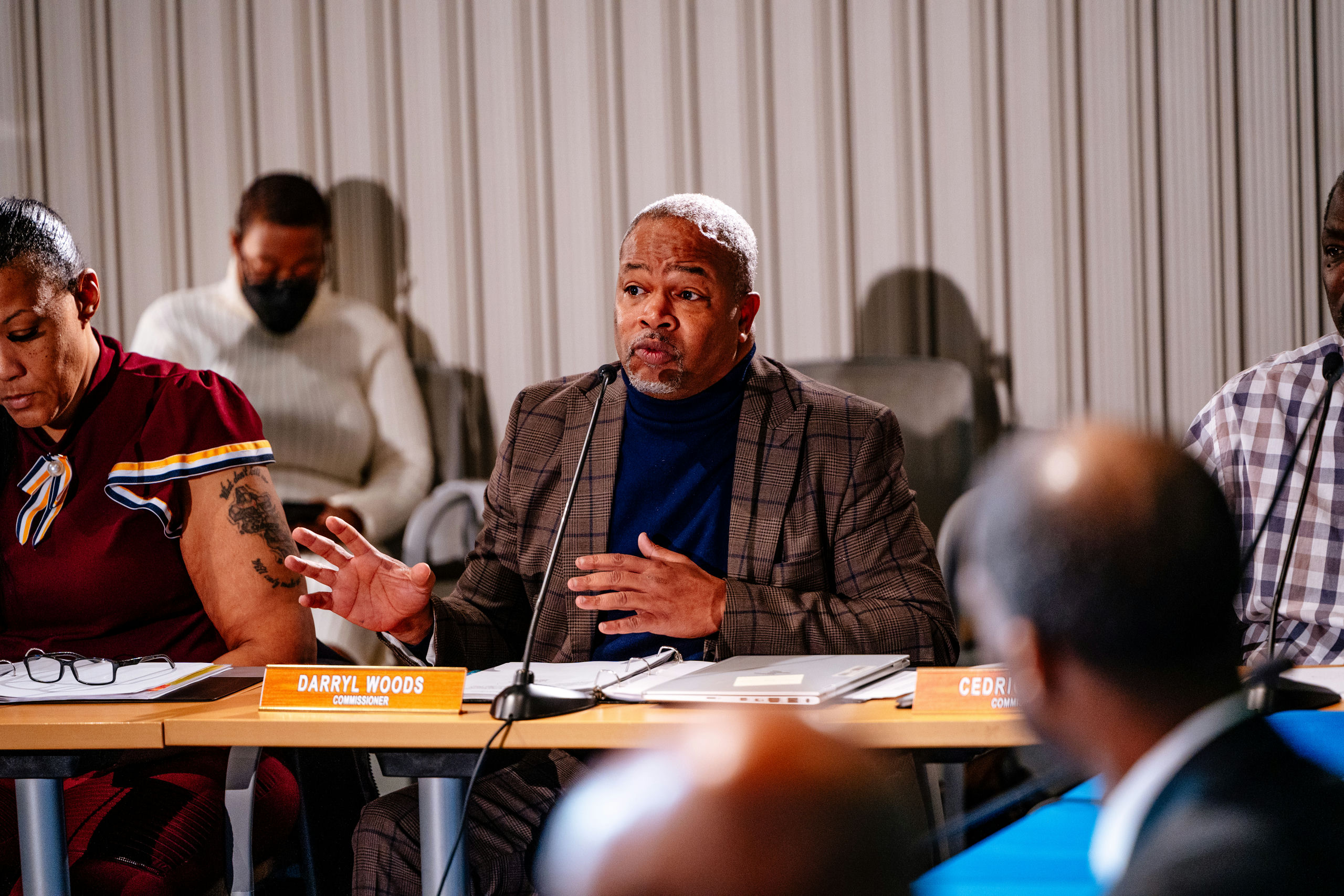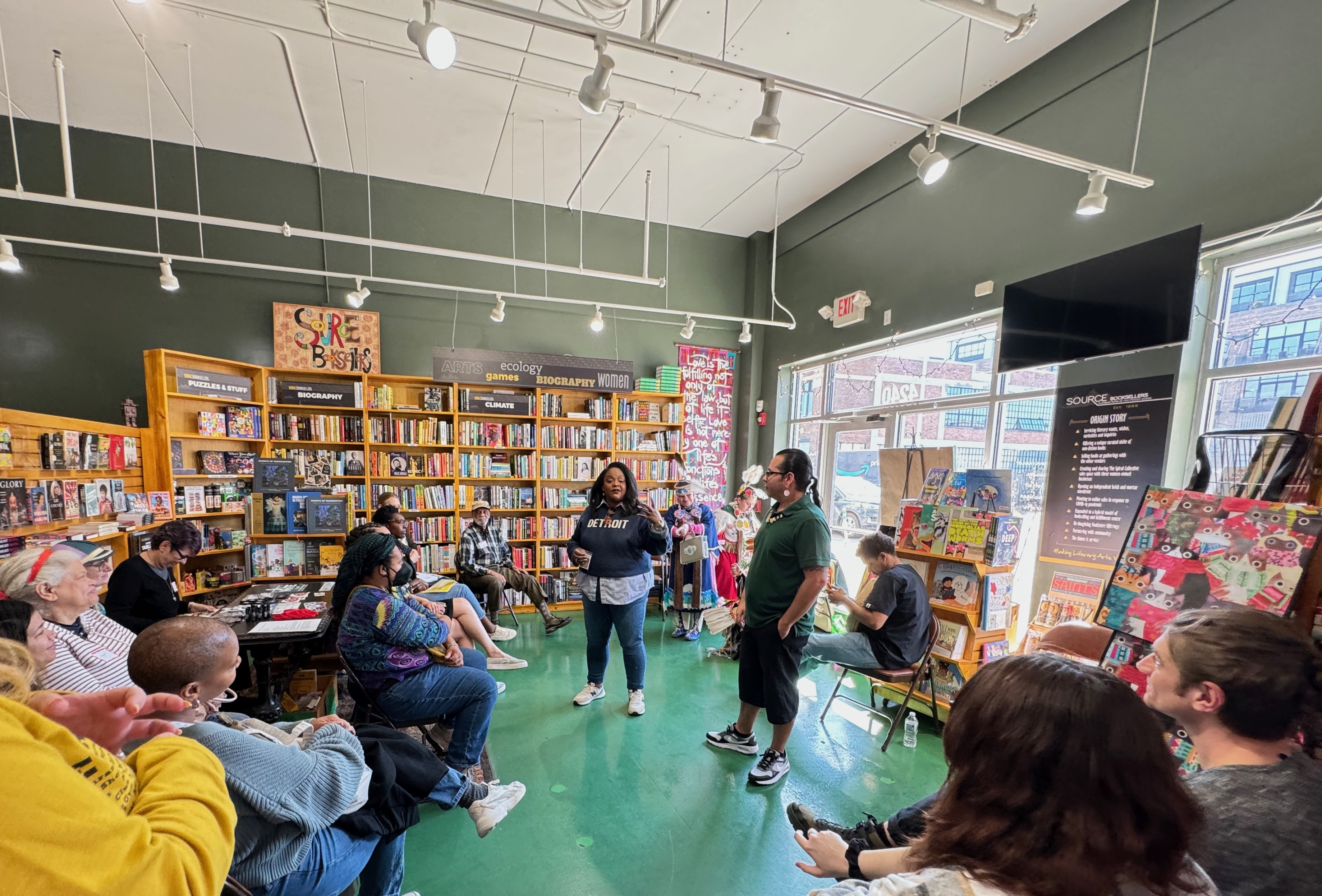The board that provides police oversight in Detroit has elected a returning citizen as its next chair. Darryl Woods is the chair-elect of the Detroit Board of Police Commissioners.
In 1990, when Woods was 18, he was convicted of first-degree premeditated murder, first-degree felony murder, assault with intent to rob while armed and felony firearm possession. According to witness testimony detailed in court documents, Woods was at the scene of a drug deal where a man was shot and killed by one of Woods’ companions. Records indicate that Woods shot another man, who survived.
Years into his life sentence, Woods’ conviction was overturned after a witness recanted their testimony. However, that dismissal was later reversed, and higher courts upheld the original decision. Woods ultimately served 29 years in prison but was released after his sentence was commuted by then-Gov. Rick Snyder in 2019.
Woods, a licensed elder at Greater Grace Temple, said his work inside prison included raising funds to assist crime victims and families in need, and working with the youth deterrent program Cared Straight at what was then Ryan Correctional Facility. Since his release, he’s been involved in community violence intervention programs with The People’s Action, Growth Works and as a coalition member with FORCE Detroit.
Woods began a five-year term in January as an at-large police commissioner after being appointed by Mayor Mike Duggan. The board has 11 seats, but one was vacant on June 13 when the board voted for the new chair. Three commissioners were absent, including Woods, who watched the meeting online but was not allowed to vote because he wasn’t attending in person. Of the commissioners present, three voted for Woods, two voted for Linda Bernard and two abstained.
Woods will replace outgoing chair QuanTez Pressley on July 1, when Pressley’s one-year term as chair expires.
Woods is inheriting a board dealing with a backlog of citizen complaints, difficulties filling positions and personality clashes.
Outlier Media’s Laura Herberg spoke with Woods about his past and how he plans to move the board forward.
This interview has been edited for length and clarity.
Outlier Media: Where did you grow up?
Darryl Woods: I grew up in the great city of Detroit.
What side? What part?
I was a young man who grew up on the westside of Detroit. I lived on the eastside, I hung out in the North End — so I’m a Detroiter through and through. I’ve been all through this space.
I’m a person who grew up in the streets of hard knocks. My mother was addicted to drugs, and she had a breakdown when she was pregnant with me. And so my grandmother primarily raised me in her home. So, I’m a person who experienced a lot of things in life and a lot of hardship and a lot of issues.
Before I was incarcerated, my mother got off drugs. She became a hero of mine. I was deeply inspired by her, especially when I got incarcerated. She became my biggest champion, and she fought hard for her baby boy.
I lost my mother when I was incarcerated. I couldn’t go to her funeral. I lost both of my grandmothers when I was incarcerated. And so what I say to young people today is, it’s not how you start, it’s how you finish.
“The greatest obstacle, sometimes, is us. … We have to learn to turn to each other and not on each other.”
You were convicted of first-degree murder. Some people are saying you shouldn’t be chair of the Board of Police Commissioners. What is your reaction to that?
I was charged with first-degree murder under the theory of aiding and abetting. … Neither I nor my co-defendant killed anyone. … The very theory wasn’t that I killed the person. No witness got up there and testified to that.
I was a juvenile. It was a terrible situation. I’m not saying that I didn’t do or wasn’t in a place where I wasn’t supposed to be at. As a juvenile, I made juvenile decisions. And one of the toughest decisions was to be at a drug house when something was going on. I had no business there. I had made some poor choices as a juvenile, and I own that. I take full responsibility for that.
The thing is, the hatred that has spread as it relates to people returning back to the community should never be tolerated. If people are paying taxes, if people are doing what they’re supposed to do, and they’re showing that they want to give back to their community, who in the world is going to tell them that they should not serve in any capacity?
How do you feel about being elected chair of the Board of Police Commissioners?
This is something that I didn’t initially ask for, wasn’t seeking out. But it’s a high honor to do everything we can to be able to serve the citizens and to be able to make sure that we help this community get answers for their complaints.
But also there’s a dual purpose. We need to make sure that we are helping the police department get all the tools and resources that it needs to be able to do the best job that it possibly can for the citizens.

Does it matter to you that you won the chair seat with just three votes from your fellow commissioners?
During the meeting, I was in Washington, D.C., doing some juvenile justice work with the Annie E. Casey Foundation. It was the first Board of Police Commissioners meeting I ever missed (in person). I was on Zoom, but I wasn’t able to vote. So there technically would have been more votes than that.
What do you hope the board will accomplish with you as chair?
When the current chairperson made me the chair of the special personnel and training committee, we had been grossly understaffed with investigators, administrative assistants and a policy director. Since I’ve been there … we got that job done.
Under my leadership, I want the board to work together as a team to do everything that we can to get the (citizens complaints) backlog addressed in an honorable way, in a legal way, in a compassionate way. And not just to throw their complaints in the garbage.
What do you think the board’s greatest obstacles are?
The greatest obstacle, sometimes, is us. And sometimes we have to learn to get out of our own way. And we have to learn to turn to each other and not on each other. This is not a personality contest. …
One of the biggest obstacles was that we were understaffed. And now that we are fully staffed with investigators, we’re willing to go back to City Council and to the mayor to ask for more funding, even one-time funding, to put more staff in place to tackle the backlog (of citizen complaints).
I want to make sure that we put the citizens’ complaints online where people can see our numbers on a regular basis of how many citizen complaints were addressed. We want to let them know … how many came in and where they’re at in the process. So we’re going to be working very, very hard to use technology to our advantage to be able to tackle this issue.
You mentioned that one of the board’s greatest obstacles is sometimes itself. How will you help the board get out of its own way?
I’m not here to throw stones at my fellow board members. I’m not here to be disrespectful or to do anything negative. I just want to be a positive influence on the board with my colleagues, like the outgoing chairman has been to me and many others, and say, ‘Hey, let’s not get into petty bickering.’ …
And I’m asking everybody to vote their conscience and to be diligent in efforts to read emails, study the cases and study everything we need to so that we can function at our best. Because the citizens of the city of Detroit deserve our very best.
Detroit Documenters Chandler Vaughan and Roshaun Harris contributed to this story.




